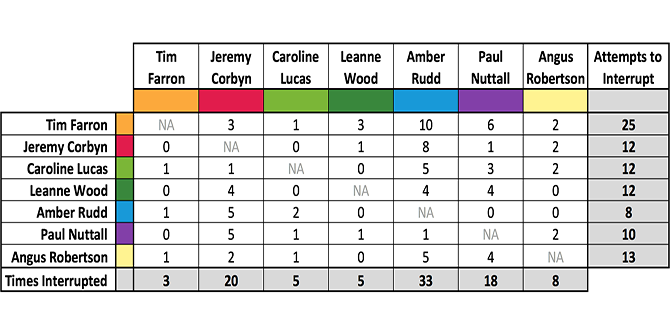We asked our Election Experts to comment on last night’s Leader’s debate on economic affairs. This is what they said:
Tim Leunig – LSE Economic History
In the last few days and weeks, it has seemed as if the only economic issue in the campaign was the deficit. In reality decisions that have influence over the economy in the longer term are much more important – can we educate our children to get decent jobs? How can we avoid short term unemployment becoming unemployment for life? What will we produce in the future?
This debate tackled a number of those issues, with manufacturing, for example, featuring explicitly. On some areas leaders were honest, on others naïve (rising productivity in manufacturing means that even if we produce more goods, we will need ever fewer people to produce them). All three seemed rather statist at times – my government would do this, my government would do that. The market economy seemed to have been squeezed out.
The leaders did what we might expect of them – Brown was repetitive but knew his stuff. One could see why people question whether the somewhat ruddy-faced David Cameron is the “real deal” – he announced at the end that how a society looked after the poorest was the key, having said nothing at all about how he would help the poorest in our society. Something somehow, just doesn’t connect. Nick Clegg remained the same cheerfully plausible leader he has been throughout the debates.
The barbs were sharp, but not personal, and few made much sense. Gordon Brown kept saying that the others would cut child tax credits, which they will, from families earning over £50,000. Since when was Labour’s raison d’etre protecting upper middle class benefits? David Cameron claimed that the LibDem policy of equalising VAT on new homes and house refurbishment would make new homes more expensive, when (as he must know) any housing economist will tell you that VAT on new homes would mean lower land prices, not higher house prices.
From a personal point of view it was nice to see housing come up as an issue – from someone who (quite rightly) wanted cheaper houses, not more house price rises (Presumably she is not a Daily Mail reader!) How Britain has got to a stage where this lady and her husband, one a chartered accountant the other also in work, cannot afford a home of their own, beggars belief. None quite told her the truth – that we have to allow builders to build millions more homes if she is to be properly housed, but it was good to see that low house prices, as well as high house prices, can win votes.
Professor Patrick Dunleavy – LSE Public Policy Group and LSE Government Department
Enough with the emoticons already!
Watching the final debate end to end, I had one dominant feeling and one key moment (which I’ll come to later on). The dominant feeling was just how bad the House of Commons is as a preparation for government leadership. Parliament teaches MPs to emote, not to reason very well, not to argue, but just to have feelings and find ways of projecting this to others – in short to emote. The acme of a good Commons performance is to emit the maximum number of units of emotion (let’s call them emoticons for short) in any given time period.
In the final Prime Ministerial debate David Cameron solely concentrated, and Nick Clegg mainly concentrated, on maximizing the number of emoticons they emitted. You kind of lost count of the number of time they said “What I think is that…”, with a kind of verbal double-bold, large font sign around the I. It doesn’t really matter in the Commons if you are apparently solipsistic, you see – a level of self-absorption that might look a bit mental in other occupations is par for the course amongst top politicians. Nor does it matter what on earth the basis of your emotion or feeling is, just to underscore that you really do feel it.
David Cameron’s advocacy of ‘Time for an (unspecific) change’ made the overall vagueness and lack of any intellectual or factual or evidential grounding to what he said really rather starkly apparent. David, it seems, wants what we all want, only he really wants it. When Brown or Clegg pressed him for anything detailed by way of an answer, a kind of ‘disbelief face’ crept over him – his expression said that he just could not believe that a responsible politician could behave in such a bad taste way in public.
Many different contacts in central government have told me in recent weeks that they are amazed at how little trouble the Tories have taken to understand their putative departmental briefs, should they form the government. Shadow ministers and their staffs have apparently made no real effort at all to take up the offer of detailed briefings on how departments and their policy sectors work, what the budgetary options might be, or even how to make Tory policies look more articulated or realistic. They just have not wanted to know. And watching Cameron’s performance you could see where the push for this neglect was coming from. After all, what’s the use in talking to civil servants, or messing around with the oily, garage-mechanic stuff of governing, when all you need to do is up the emoticon count.
Nick Clegg was doing emoticon maximization too, but you could see that he at least knows there is more to governing than that. He veered off into little sallies of facts, evidence and policy specifics from time to time, and responded a bit to the others’ comments. And it was in one of these little ‘better self’ periods, that my key moment of the whole debate happened.
Clegg was under pressure on immigration, as a liberal always will be given the resting state of British public opinion in a veneered, mild, Daily Mail-level anti-foreigner-ism. And perhaps he was stung a little by the questioner who linked immigration to the distance between Westminster politicians and ordinary folks. So after Cameron played his Daily Mailish line about a strict cap on immigration, Clegg suddenly challenged him by voicing the unsayable truth that Tory and Labour spokespeople never say – that you can’t restrict immigration from EU countries, that this accounts for 80 per cent of migration into Britain, and what anyway was the level of cap that Cameron was proposing? The mixed ‘affronted and puzzled-beyond-belief’ look that was Cameron’s only response was a joy to behold.
Meanwhile over on the right-hand lectern, Gordon Brown’s emoticon count was low to very low. Time and again he seemed to want to bring facts into the debate, to be specific, to answer the question, to be realistic. You could see it was all up for him in British politics. We can’t go on with leaders as badly trained as this for goodness sake!
Dr Leandro Carrera – LSE Public Policy Group
Where was Clegg?
Last night debate provided us with some interesting insight, even if limited, of what measures each of the candidates will favour in government. This was perhaps David Cameron’s stronger performance of all three debates. He made a strong commitment not to join the Euro, defend British jobs, reducing national insurance contributions and limiting immigration. Gordon Brown, while acknowledging his recent gaffe, defended the most important (and controversial) measure of his administration: the bailout of banks. He simply argued that it was needed to avert an economic depression. He also made a strong defense of tax credits and inheritance tax, accusing Cameron of wanting to eliminate, or at least reducing both of them. And Nick Clegg? Well, simply he was not there. He repeated some of his well known campaign pledges such as eliminating cash bonuses above 2,500 pounds forgetting, as Brown rightly pointed out, that such a measure should be coordinated with other countries because otherwise it would generate a massive relocation of businesses to other countries. When asked about how to help struggling manufacturing companies he simply argued that it was a matter of encouraging banks to ease lending, while both Cameron and Brown pointed out that the long term solution would be to encourage businesses to focus on new technologies in which the UK has a comparative advantage.
Overall, none of the candidates was specific on where the cuts to public spending will be applied. Indeed, towards the end the debate focused much more on how to deal with immigration rather than with the economy itself. This was one of the few points in which Clegg seemed to do well by pointing out, as he did in the previous debate, that some regularization must be applied to illegal immigrants. However, both Cameron and Brown were clearer in explaining some of the economic policies that they will favor once in government. In the end, this debate may prove to be useful to indicate us who will be the two main contestants in six days’ time.







